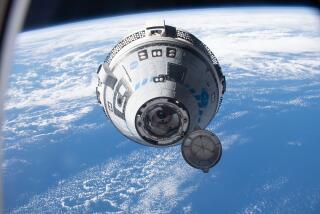New Delay Sought in Start of Space Station Assembly
- Share via
CAPE CANAVERAL, Fla. — Burdened by Russia’s continual money crunch, NASA on Friday recommended that the start of space station construction be postponed until November, one year later than planned.
It’s the latest in a string of delays for the international space station, which should have had astronauts and cosmonauts moving in this month under the original proposal.
The Russian Space Agency was supposed to haul up the first component of the station, a motion-control chamber, last November. But the launch slipped to June because of the Russians’ inability to complete another crucial segment.
Earlier this month, NASA said the first assembly mission would be no earlier than August. But officials finally conceded that a November launch date was preferable. The Russians had pushed for a November liftoff to limit the amount of time the control chamber would be in orbit, and thereby limit the amount of fuel it used, before their next piece arrived.
NASA spokesman James Hartsfield said Friday that representatives of all participating space agencies will review NASA’s recommendation for a November start during a meeting next weekend. In all likelihood, the recommendation will be accepted.
“It’s not official yet,” Hartsfield said. “But NASA is working toward those dates right now.”
Under the latest plan, a Russian rocket will carry up the control chamber from Kazakhstan on Nov. 20, Hartsfield said. Space shuttle Endeavour would follow on Dec. 3 with the second component, a connecting passageway named Unity.
The third piece--Russia’s beleaguered service module--is supposed to be completed in time for a spring 1999 launch.
Astronauts and cosmonauts cannot live on the station until the service module and its life-support systems are in orbit. NASA hopes to have the first permanent crew on board by next summer.
NASA expects it will take at least five years to complete the international space station. Sixteen countries are participating in the project, expected to cost well into the tens of billions of dollars.
NASA’s top officials acknowledge that Russian participation has not only delayed the station but hiked its price, the opposite of what was supposed to happen. It has also left the shuttle flight schedule in turmoil.
Columbia, for example, was supposed to lift off in December on a telescope-delivery mission led by the first female shuttle commander, but that mission now likely is off until January.
Delaying space station construction until the end of the year means that NASA will have a rare summer without a shuttle flight.
Discovery is scheduled to blast off June 2 on NASA’s last trip to Russia’s Mir space station. After that, the next shuttle flight won’t be until late October, when Discovery returns to orbit with Sen. John Glenn D-Ohio), the first American to orbit Earth.
More to Read
Sign up for Essential California
The most important California stories and recommendations in your inbox every morning.
You may occasionally receive promotional content from the Los Angeles Times.













